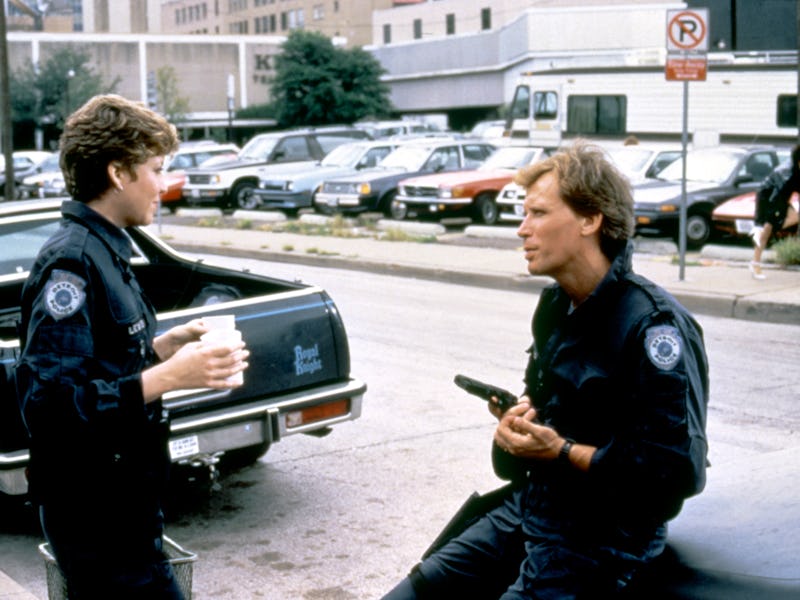You need to watch the most subversive sci-fi movie on Amazon Prime before it leaves next week
If you’ve never seen this movie there will be trouble.

Dead or alive, you’re coming with me. This catchphrase, uttered by Alex Murphy (Peter Weller) in RoboCop, initially scans as a cool threat from a gun-toting badass. But if you’ve actually seen RoboCop, then you know the line is tragic. Here’s why this 1987 Paul Verhoeven masterpiece is worth another look, especially before it leaves Amazon Prime.
RoboCop did well at the box office, despite challenges. Released in the summer of 1987, it was going head-to-head with James Bond film The Living Daylights and horror flick The Lost Boys, and was also contending with a theatrical re-release of Snow White and the Seven Dwarfs. There are probably two reasons it wasn’t crushed: First, the title slaps, and second, the poster of RoboCop getting out of his car is one of the best pieces of ‘80s movie marketing.
Is he all cop? If you’ve seen the movie, the answer is clearly no.
The hook for RoboCop was there. It looked like a big summer blockbuster that could promise thrills similar to the original Terminator (1984) or even the previous year’s Aliens. Like those two films, RoboCop belongs to a fascinating era of mainstream sci-fi films that were aimed almost exclusively at adults, and that frequently employed tropes found in gory slasher movies. Coverage of RoboCop was just at home in Starlog as it was in Fangoria. It had a hard R rating and, like the original Terminator, it more than earned it.
But the basic difference between Terminator and RoboCop is simple: The latter isn’t what it seems to be. With horror-sci-fi like Aliens and Terminator, what you were getting was pretty much telegraphed in the marketing. But if you’ve never seen RoboCop and are only aware of it through its name and imagery, you really have no idea what kind of movie it is. For a contemporary audience, it’s probably best to imagine a movie-length episode of Black Mirror designed to make you feel awful about corporate greed, but filmed like a grindhouse horror movie.
It’s no spoiler to say that good cop Alex Murphy (Weller) is killed early in the movie, then resurrected Frankenstein’s monster-style, as a cyborg called RoboCop. It’s also tempting to say that the movie succeeds because this is played as an obvious tragedy. As RoboCop, Murphy says “dead or alive, you’re coming with me,” because it was one of the last things he said before he was killed. He also twirls his gun like a cheesy gunslinger because, before death, he was trying to imitate a TV hero to make his son proud.
But this tenderness isn’t why RoboCop is great. It’s great because its premise is audacious. In this twisted near-future, a giant corporation called OCP has bought the police force outright. Everything Murphy's dealing with isn’t really about evil crime bosses or scheming bank robbers. Instead, the movie is about the corruptive evil of corporations when they influence what should be publicly regulated agencies. It’s as if Cop Land was a sci-fi movie, fused with the biting world-building of a Philip K. Dick novel.
Peter Weller as RoboCop.
RoboCop’s gut-churning violence can make you uncomfortable. But it will make you even more uncomfortable because it’s hard to figure out who to root for. The systems that Alex Murphy was a part of were corrupt before he was murdered and transformed into RoboCop. The idea that the movie is a parable about technology gone too far is barely relevant to the actual story; instead, the movie suggests that its technological aspect is a subversive trick.
When you watch RoboCop, what you’re seeing is a great science fiction film about how people are systematically dehumanized. It’s a movie that indicts the numbness of a consumer culture, and the most violent anti-violence movie of all time. RoboCop’s power is that there’s not one reductive meaning to its story, and its brilliance is that you can’t look away for a second.
RoboCop is streaming on Amazon Prime until the end of the month.